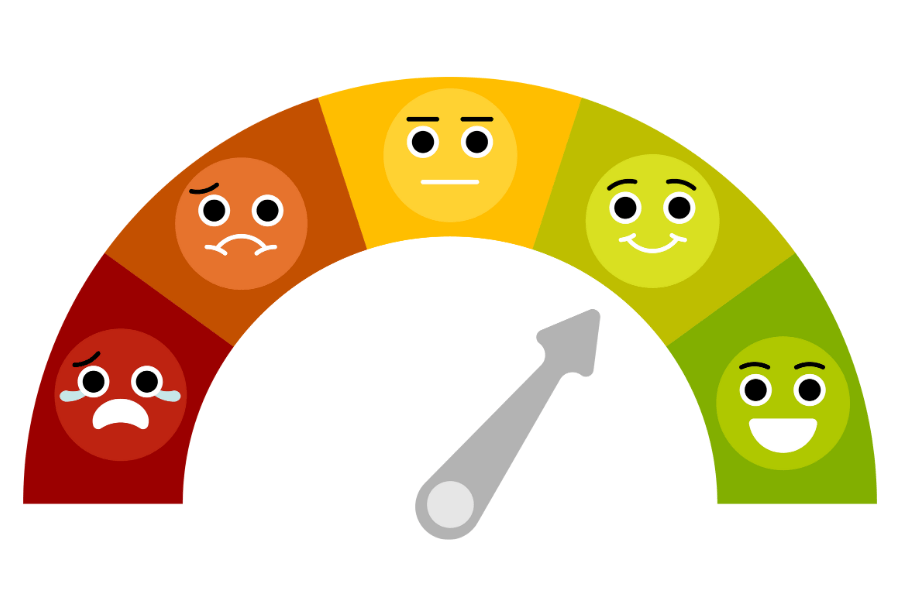Thanks to diet culture, everything you put in your mouth can taste a lot like guilt. That slice of brownie could be the most tastebuds-pleasing, decadent, chocolatey goodness you’ve ever eaten … and, yet, instead of mmm-ing and ahhh-ing your way to pure bliss, you’re downright sweating inside:
- Oh god, what have I done? How many calories is this?
- I'm probably going to gain a gazillion pounds from this.
- Well, it looks like I'll have to skip dinner tonight.
If you’re sick of feeling utterly miserable around food, there’s good news: you can do something about it. Below, learn how to heal your relationship with food, so you can finally enjoy your meals without feeling like a (tightly wound-up) ball of shame, stress, and anxiety.
#1: Stop labeling foods as “good” or “bad”
“Salad” — good. “Fried foods” — bad. Thinking in such dichotomous terms hurts your relationship with food because you’ll likely conflate eating behaviors with your morality: “Oh, I ate so many bad foods today! I’ve been so naughty!” In truth, food is food and has absolutely zero morality. So, the next time you catch yourself thinking a particular food is good/bad while eating it, remind yourself that you deserve to enjoy all foods and that all foods can be a part of a healthy diet.
#2: Honor your hunger
Hungry? Then eat something. As logical as this may seem, the truth is that many of us ignore our biological signals, choosing instead to limit our food intake for fear of weight gain. Ironically, this tends to backfire. Research shows pent-up hunger can damage your relationship with food and cause you to behave like a real-life Pac-Man — eating anything and everything you lay eyes on.
But “honoring your hunger” is often easier said than done. Especially when you’re already so used to disregarding your hunger cues. To change that, try to check in with yourself and rate your hunger level on a scale of 1-10 every one to two hours. Ideally, you should eat when you rate your hunger a six or above.
#3: Practice mindful eating (allow yourself to enjoy your food)
And when you’re eating, really savor it. Eating should be an enjoyable experience. Here’s how to practice mindful eating:
- Eat without distractions (yep, this means no digital devices!) Ideally, you should find a dedicated space to sit.
- Engage all senses. Notice the food's colors, smells, sounds, tastes, textures, and how you feel when eating. Pause periodically to re-engage these senses.
- Chew thoroughly. Or, in other words, don’t just gobble, gobble, gobble.
Above all, be careful about your thoughts. When you're eating, it's normal for old, misinformed thoughts about food to crowd your mind (e.g., this is sinful!) Take a deep breath and let them pass without judgment. And once your mind is clear, remind yourself that food is food and has zero morality, as mentioned earlier. Don't worry. This process is a little like meditation. The more you do it, the better you’ll become at ignoring unwanted, unhelpful thoughts about food.
#4: Be patient with yourself
On the surface, healing your relationship with food can sound straightforward. This means you may think it'll only take a few days (or a few weeks, max) to feel at peace with your eating behaviors. Reality check: that's unlikely. Your relationship with food is shaped by years — entire decades — of diet culture narratives. So, give yourself time, grace, and space to relearn your thought patterns about food.
Don’t be afraid to seek professional help
While there’s a lot you could do on your own to heal your relationship with food, don’t forget that health professionals, such as nutrition coaches, registered dietitians, and psychiatrists, could also help you:
- Understand how to eat to meet your nutritional requirements,
- Break up with disordered eating tendencies, or
- Overcome an actual eating disorder, like anorexia and bulimia
Don't be afraid to seek help when you need it.




























































Join in on the Conversation
Your email address will not be published. Once your comment is approved, it will be published.